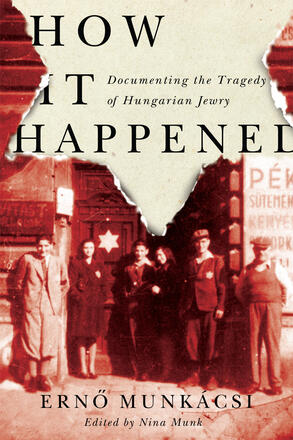
How It Happened
Documenting the Tragedy of Hungarian Jewry
A detailed, first-hand account of the atrocities committed against Hungarian Jews during the Holocaust.
Description
A gripping first-hand account of the devastating "last chapter" of the Holocaust, written by a privileged eyewitness, the secretary of the Hungarian Judenrat, and a member of Budapest's Jewish elite, How It Happened is a unique testament to the senseless brutality that, in a matter of months, decimated what was Europe’s largest and last-surviving Jewish community. Writing immediately after the war and examining only those critical months of 1944 when Hitler's Germany occupied its ally Hungary, Erno Munkácsi describes the Judenrat's desperation and fear as it attempted to prevent the looming catastrophe, agonized over decisions not made, and struggled to grasp the immensity of a tragedy that would take the lives of 427,000 Hungarian Jews in the very last year of the Second World War. This long-overdue translation makes available Munkácsi's profound and unparalleled insight into the Holocaust in Hungary, revealing the "choiceless choices" that confronted members of the Judenrat forced to execute the Nazis' orders. With an in-depth introduction, a brief biography of Erno Munkácsi, ample annotations by László Csosz and Ferenc Laczó, two dozen archival photographs, and detailed maps, How It Happened is an essential resource for historians and students of the Holocaust, the Second World War, and Central Europe.
Reviews
"Erno Munkácsi's How It Happened is a riveting account, told by one who was there, of the anguished decisions that Hungarian Jewish leaders made and of the actions that they took (or did not take) as the Holocaust unfolded around them. One of the very first histories of the Holocaust in Hungary, Munkácsi's account defies genre, combining careful analysis of documentary sources with powerful and detailed personal recollections. The publication of this expertly annotated English translation is a major contribution to international Holocaust studies." Paul Hanebrink, Rutgers University and author of In Defense of Christian Hungary: Religion, Nationalism, and Antisemitism, 1890–1944
"This is an increasingly anguished memoir by someone whose faith in law and humanity was broken as the details from the Auschwitz Protocols (testimony from camp escapees) became known ... profoundly sad but important reading. We all know how the war ends and how many lives were lost, but this eyewitness account is a good primary source document for understanding how ethnic hatred overtook one of Europe's most seemingly cultured societies." Foreword Reviews
"How It Happened succeeds both as a riveting, personal account of the days leading up to the Holocaust in Hungary and as a scholarly work that sheds new light on the tragedy of Hungarian Jewry. A valuable addition to Holocaust literature, this is a very readable story drawn from the pages of a catastrophe we are still unable to fully comprehend." Anna Porter, author of Kasztner's Train: The True Story of Rezso Kasztner, Unknown Hero of the Holocaust
“Could the members of the German-appointed Jewish Council in Hungary have done more to help their fellow Jews, miraculously still numbering more than eight hundred thousand in 1944? The fact that more than half a million perished but the rest survived, including the members of Jewish Council, has led to endless soul-searching and bitter reproaches. Erno Munkácsi’s honest account of his and the rest of the Council’s doings makes clear that it was not the Jewish Council but the non-Jewish Hungarians who decided who would live and who would die. It is therefore the Christians of Hungary who emerge from the tragedy in part as vile murderers and robbers, in part as indifferent onlookers, and in part as compassionate saviours.” Istvan Deak, Columbia University and author of Europe on Trial: The Story of Collaboration, Resistance, and Retribution During World War II
"One of the first of several immediate postwar engagements with the Hungarian Holocaust, this volume-originally published in 1947 and now translated into English-breaks the myth of silence that the Holocaust historiography claimed has marked this period. The book can be read productively in conjunction with the rich secondary literature on other Jewish Councils set up by the Nazis in places like Warsaw and Lódz for a more nuanced understanding of the dilemmas of Jewish leaders. The book also includes an excellent contextual essay, glossary, biographical note, and critical apparatus. Summing Up: Essential." Choice
"Beyond its value as a primary source, Munkácsi's account is compelling as a human story, and will no doubt prove to be provocative reading for students, scholars, and the general public alike." Hungarian Studies Review